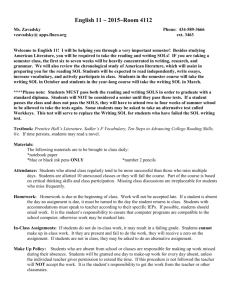Submitted Company for teacher evaluation
advertisement
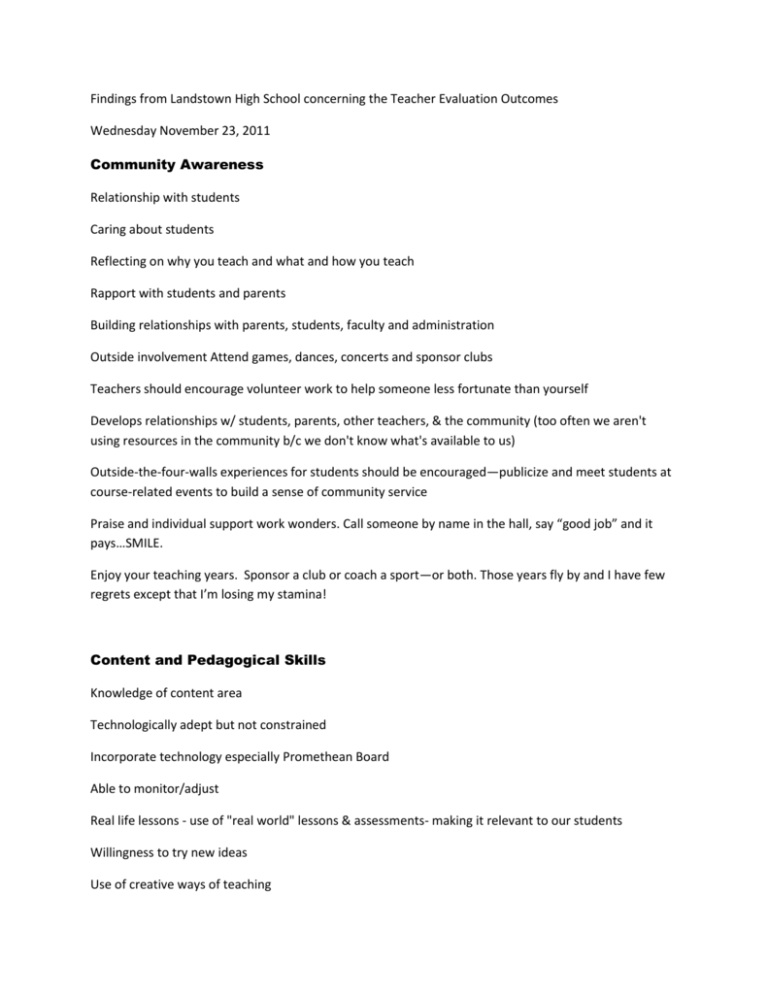
Findings from Landstown High School concerning the Teacher Evaluation Outcomes Wednesday November 23, 2011 Community Awareness Relationship with students Caring about students Reflecting on why you teach and what and how you teach Rapport with students and parents Building relationships with parents, students, faculty and administration Outside involvement Attend games, dances, concerts and sponsor clubs Teachers should encourage volunteer work to help someone less fortunate than yourself Develops relationships w/ students, parents, other teachers, & the community (too often we aren't using resources in the community b/c we don't know what's available to us) Outside-the-four-walls experiences for students should be encouraged—publicize and meet students at course-related events to build a sense of community service Praise and individual support work wonders. Call someone by name in the hall, say “good job” and it pays…SMILE. Enjoy your teaching years. Sponsor a club or coach a sport—or both. Those years fly by and I have few regrets except that I’m losing my stamina! Content and Pedagogical Skills Knowledge of content area Technologically adept but not constrained Incorporate technology especially Promethean Board Able to monitor/adjust Real life lessons - use of "real world" lessons & assessments- making it relevant to our students Willingness to try new ideas Use of creative ways of teaching “Keep up with your subject area.” Nothing worse than the teacher who uses laminated lesson plans for “Day 30” and never adjusts for new developments Conceptual Understanding Encourage students to take risks Evidence of understanding in finished works I’m not exactly sure what “the needs of the 21st century learner” entails. It seems to me that many students today lack basic skills like reading, the ability to write well, simple math skills, etc. They are proficient at using technology, but many students lack a basic foundation that I would consider important. So, I would want to reinforce these more “old school” skills in addition to “21st century” skills. Balanced Assessments Provide timely feedback Authentic Assessments and considering all disciplines for flexibility Relate to real world Authentic and varied assessments Assessment evidence- real world Differentiate- vary assignments to meet needs of all students Questioning strategies encourage global thinking Knowledge/understanding of content Reflective practices Field trips can be enriching, but they must be relevant, well-planned, and almost “strenuous” –that is, there must be genuine academic content introduced and very little downtime Guest speakers, likewise, can make the course content relevant and interesting—often a guest speaker can augment the curriculum and add a “real” perspective or dimension Use progress reports, report cards, and other teacher-produced materials to ensure the student is aware of his strengths and weaknesses. I think it’s particularly important for seniors to know how their grades are determined, especially in the fourth quarter. They need a little reminder of their grades so far, the remaining major grades, how one knows he’s exempt from the final exam, the value of the exam, how one qualifies for “honor graduate” status, etc. When you set deadlines or issue a threat or set up criteria, barring a major development, stick to those announcements. Students need direction, guidance, certainty in their lives and sometimes our “sticking to our plans” is a vital life-lesson. They’ll learn to plan, too. Technology/PDP - Infusing technology I think this one can/should meld into the next category. Integrate technologies into the learning environment My concern here is “technology for technology’s sake.” Ultimately, quality instruction and solid content knowledge trumps all. - Keep trying new things These next three are a bit amorphous. - Embrace new methods/ideas Keep learning There needs to be some specificity here. My feeling is that our current recertification process does not encourage development IN THE CONTENT! Ultimately, we would all benefit from greater depth of knowledge in HISTORY, rather than learning how to do a foldable. - Develop PDP sessions to improve proficiency with instructional technologies Content Knowledge This category is woefully underserved. How do they measure “thoroughly?” “Best practices?” Doesn’t that change fairly quickly? And “best” according to who? - Possess knowledge of content area and “best practices” - Know subject matter thoroughly Rigor - Must challenge students - Using higher level thinking - Motivate students - Poses higher-level thinking questions (critical thinking) Encouraging students to reach their mark of excellence Yikes! What is this? Would need to be defined. - Expects high performance - Challenge students with materials and activities Specificity needed. Engagement - Developing innovative learning experiences - Keeps learning varied and interesting - Makes learning fun - Develop modern assessment strategies By who’s standard? This is very much in the eye of the beholder. - Provide a variety of activities - Encourage students - Teaches with enthusiasm Balanced Assessment - Communicates expectations (rubrics, environment, etc.) - Rubrics - Evaluate in various ways (formative and summative assessments) - Gives opportunities for students to measure their progress listed below: Overall, this is a very comprehensive list you provided as an example. My only concerns are in those areas where greater definition is needed, and with those areas in which subjectivity could be excessive. I think that a greater mandate for content knowledge must exist, and if it is not part of the evaluation system, then the recertification must be the route pursued. Even those of us with advanced degrees must keep up with the scholarship in our fields. I believe that team teaching in the content area would be a very successful option. Two classes could be combined at times to deliver the best that each teacher could offer. It would be fun, interesting and an approach that has not been tried at the high school level. Student Engagement and Self-Directed Learning Student enthusiasm Students develop and enhance their own voice in the learning process Student Accountability Professionalism Teacher’s enthusiasm and desire to research current strategies and implement them into the learning experiences Model Professionalism Lead by example Teachers should model "manners" in the classroom. Involvement in extracurricular outside class Respectful of others Professional Attire and Attendance Hold students accountable for tardiest, unexcused absences, dress code and all other school rules. (The business community expects certain behaviors, we should too.) Professionalism- in attire, attendance, attitude towards others (courtesy) Willingness to be flexible, collaborative with colleagues-- as needs arise ALWAYS remember you’re a role model. Dress, act, and conduct yourself as though your model is the best and perhaps only one the student has as a guide. Be kind, persuasive, enthusiastic, caring, informed, conscientious, ambitious, positive, hard-working, and interesting. Stretch yourself and others will do so, too. Never stop learning! (Sometimes, unwittingly, you’re the teacher, parent, and Sunday School teacher all rolled into one. Be the best you can be.) Classroom Management Engages all students in the learning process Controlled chaos Entertaining Student Outcome A teacher who have students that are taking the class for the second or third time should not have those students performance used to evaluate them. If a student is an attendance issue those students performance should not be used to evaluate them. Students with excessive discipline(referrals) should not be used to evaluate them. There was a lot of debate about those teachers who teach only high level courses vs. those who teach inclusion or lower level students. No real solutions…. But there is a concern of it being fair. In order for me to help contribute useful information regarding teacher evaluations I would need to know what “student growth” is? Is it mastery of content material? A “good” grade in the class. Passing the SOL? Is it going to be different for the multiple content areas within the school (i.e. Physical Education v. Math)? Who is going to be measuring this student growth? Is it going to be the teachers, the school administration, the school division or the state? The way that I see it, there are too many variables in order for me to contribute information in a constructive and useful way. What I think makes a “good” teacher? Student mastery of content material via SOL scores (when applicable) or a final assessment in non-SOL courses. o SOL – within 3 percentage points of the school division cumulative average. o NON- SOL – Receive a passing score on the final assessment. The final assessment is to be based on the knowledge and skills to be learned as outlined in the curriculum frame work provided by the state for the ensuing subject. - Teacher content knowledge and the effective use of passing that knowledge onto the students. o It does not matter the method in which the teacher chooses to convey that material to the students. As long as the students demonstrate mastery of the material and skills the state has determines vital to the student’s progress in that subject area. o According the video Everyday Creativity, “there is more than one right answer.” In other words, don’t tell every teacher they have to do it one particular way. Basically – Did the students learn what they should have learned, and can they do what we want them to do. Without more information this is the best that I have. Examine community survey data concerning educators
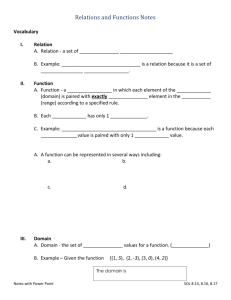
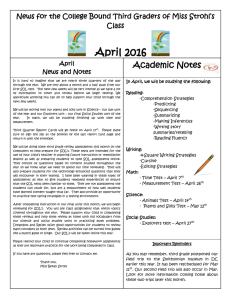
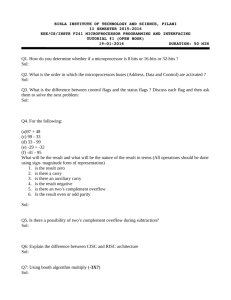
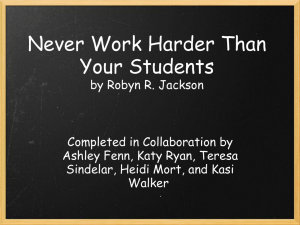
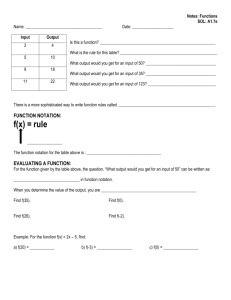
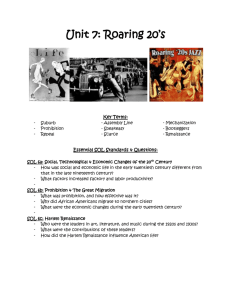
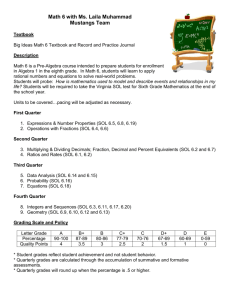
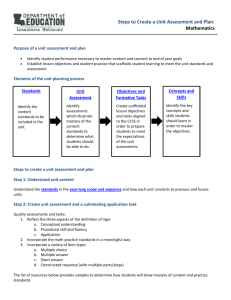
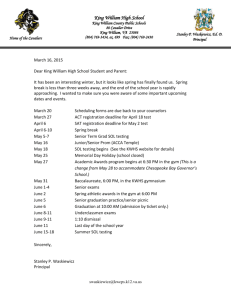
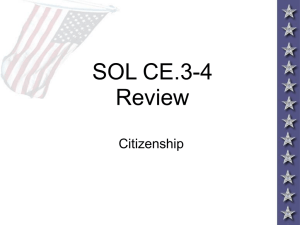
![Hw 3 (due Feb. 18, Thursday) 2.132 [Sol] Let define the following](http://s3.studylib.net/store/data/008235276_1-8b61bfb19a5bb4ca876eee34b80cf8f5-300x300.png)
